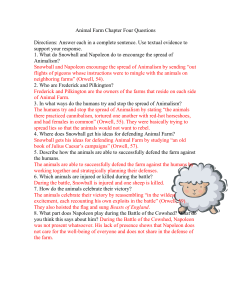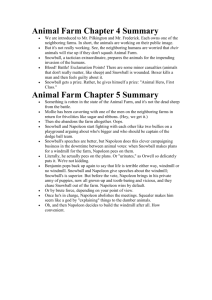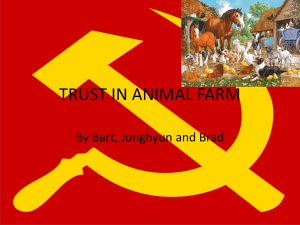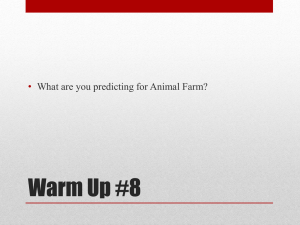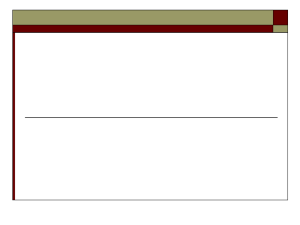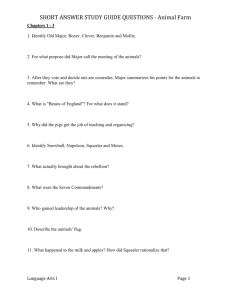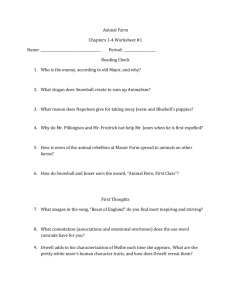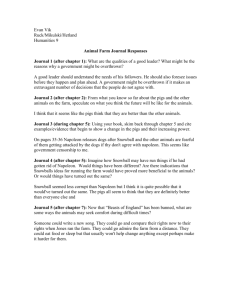File
advertisement
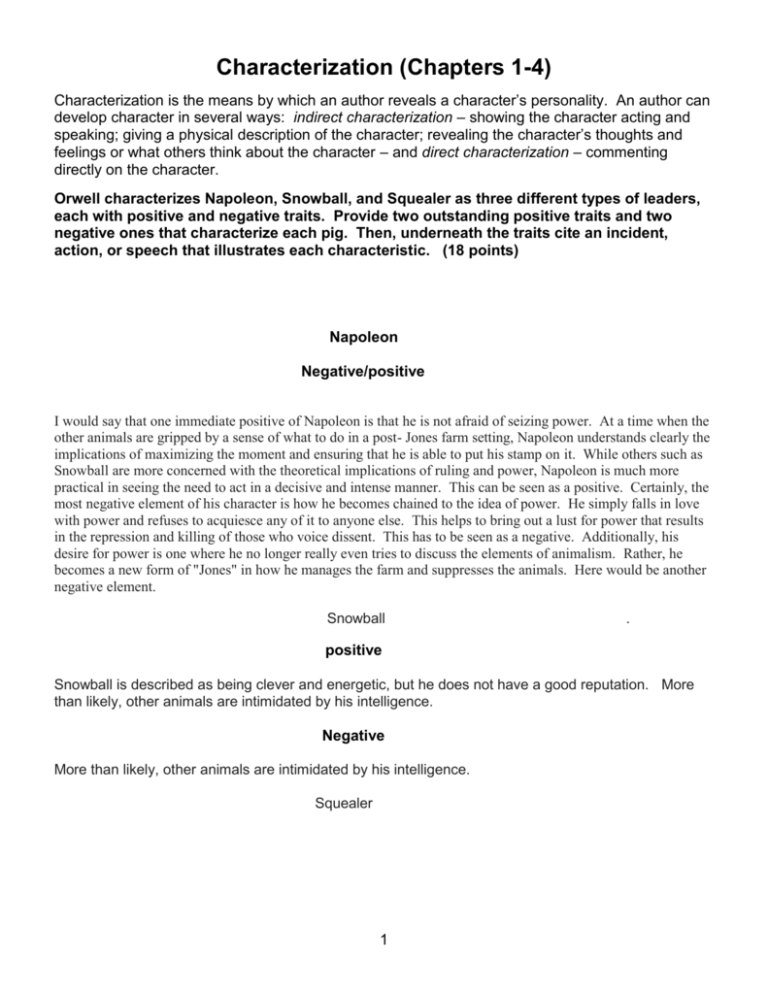
Characterization (Chapters 1-4) Characterization is the means by which an author reveals a character’s personality. An author can develop character in several ways: indirect characterization – showing the character acting and speaking; giving a physical description of the character; revealing the character’s thoughts and feelings or what others think about the character – and direct characterization – commenting directly on the character. Orwell characterizes Napoleon, Snowball, and Squealer as three different types of leaders, each with positive and negative traits. Provide two outstanding positive traits and two negative ones that characterize each pig. Then, underneath the traits cite an incident, action, or speech that illustrates each characteristic. (18 points) Napoleon Negative/positive I would say that one immediate positive of Napoleon is that he is not afraid of seizing power. At a time when the other animals are gripped by a sense of what to do in a post- Jones farm setting, Napoleon understands clearly the implications of maximizing the moment and ensuring that he is able to put his stamp on it. While others such as Snowball are more concerned with the theoretical implications of ruling and power, Napoleon is much more practical in seeing the need to act in a decisive and intense manner. This can be seen as a positive. Certainly, the most negative element of his character is how he becomes chained to the idea of power. He simply falls in love with power and refuses to acquiesce any of it to anyone else. This helps to bring out a lust for power that results in the repression and killing of those who voice dissent. This has to be seen as a negative. Additionally, his desire for power is one where he no longer really even tries to discuss the elements of animalism. Rather, he becomes a new form of "Jones" in how he manages the farm and suppresses the animals. Here would be another negative element. Snowball . positive Snowball is described as being clever and energetic, but he does not have a good reputation. More than likely, other animals are intimidated by his intelligence. Negative More than likely, other animals are intimidated by his intelligence. Squealer 1 Follow Up: In your opinion, which of the three pigs does Orwell characterize as the strongest leader? Write a short (2-3 paragraph) essay that explains your choice. Be sure to give details from the text that support your choice. There are, in my mind, two answers to this. In many ways Snowball is the strongest leader. He is the clearest thinker, the one who is actually concerned with the welfare of the peasants, or in this case the other animals. He is careful in terms of planning things like the windmill and the animals follow him because they know he is looking out for their best interests. But Napoleon emerges as the story moves along, not necessarily because he is out and out the strongest, but he is also ruthless and willing to go to whatever ends necessary to get things he wants. He uses propaganda and an attack force of dogs to make sure that the other animals follow him without question. 2 Conflict (Chapters 5-7) Conflict is a struggle between two opposing forces or characters in a literary work. Conflict can take one of these forms: (1) a character versus another character; (2) a character versus society; (3) a character versus nature; (4) two or more emotions or ideas struggling for mastery within a character. For each item below, identify the kind of conflict involved, the causes of the conflict, and the outcomes of the conflict. Create a Multi-Flow map for each item. (20 points) Clover confronts Mollie about Mollie’s contact with humans. Type of conflict: Napoleon disagrees with Snowball’s plans for the windmill. Type of conflict: The animals struggle with how to break up the stones to build the windmill. Type of conflict: Napoleon makes a policy in opposition to Animalism, trading with the enemy. Type of conflict: Follow Up: How does the execution of animals bring about a conflict of ideas within Clover? Write a short (2-3 paragraph) essay that explains the conflict in her. Be sure to give details from the text to support your ideas. 3 Summarizing (Chapters 8-10) The Seven Commandments of Animalism created by Napoleon and Snowball before the rebellion eventually are broken. First to be shattered is number four, which is revised to justify the pigs’ move into the farmhouse. In the chart below, write when the commandments are broken, and explain how they are altered, if they are altered. (14 points) Commandments When Broken Revision, if any 1. Whatever goes upon two legs is an enemy. 2. Whatever goes upon four legs, or has wings, is a friend. 3. No animal shall wear clothes. 4. No animal shall sleep in a bed. 5. No animal shall drink alcohol. 6. No animal shall kill any other animal. 7. All animals are equal. Follow Up: In 2-3 paragraphs, illustrate how the single remaining Commandment is Chapter 10 sums up the attitude of the pigs that enables them to break all seven of the commandments. 4 Literary Elements: Fables A fable is a brief, often humorous literary form which conveys a moral or message. Orwell strengthens his animal fable by developing commonly held notions of animals’ “personalities” in his characterizations. In the chart below, identify the traits for which the animals are known and how Orwell uses that trait in his character(s). (9 points) Animal Animal Trait Evidence of trait in novel characters Pigs (example) Intelligence / traditionally considered greedy It is the pigs that form the idea of Animalism, but after the Rebellion they immediately begin to hoard the riches of the farm. 1. Sheep 2. Benjamin the Donkey 3. Dogs 5 Literary Elements: Foreshadowing Foreshadowing is the use of hints and clues to suggest what will happen later in the plot. In the chart below, explain how the passage provided foreshadows a future event in the novel. (10 points) 1. The shed where Snowball had drawn his plans of the windmill had been shut up and it was assumed that the plans had been rubbed off the floor. 2. Napoleon took them [puppies] away from their mothers, saying that he would make himself responsible for their education. 3. “I believe the time will come when we shall find that Snowball’s part in it [Battle of the Cowshed] was much exaggerated.” 4. Tired out but proud, the animals walked round and round their masterpiece… the walls were twice as thick as before. Nothing short of explosives would lay them low… 5. “And remember… that in fighting against Man, we must not come to resemble him.” Follow Up: Re-read Old Major’s speech. What are two more events or actions foreshadowed in that passage? Write a short paragraph about what is said in the speech, and the event that the statement foreshadows. 6 Literary Elements: Irony Irony is the difference between appearance or expectation and reality. Verbal irony occurs when someone says one things but means something else. Dramatic irony occurs when what a character believes to be true the reader knows is not. Situational irony occurs when there is a difference between what is expected or what would be appropriate and what really does happen. In the table below, identify whether the passages are verbal, dramatic, or situational irony, and explain the irony in each passage. (15 points) Passage 1. Then there were lamp oil and candles for the house, sugar for Napoleon’s own table (he forbade this to the other pigs, on the ground that it made them fat)… Type of Irony 2. Out of spite, the human beings pretended not to believe that it was Snowball who had destroyed the windmill… The animals knew that this was not the case. 3. But the luxuries of which Snowball had once taught the animals to dream… Napoleon had denounced such ideas as contrary to the spirit of Animalism. The truest happiness, he said, lay in working hard and living frugally. 4. [T]hey were happy in their work; they grudged no effort or sacrifice, well aware that everything that they did was for the benefit of themselves and those of their kind… and not for a pack of idle, thieving human beings. 5. [H]e personally congratulated the animals on their achievement and announced that the mill would be named Napoleon Mill. 7 Explanation Vocabulary Activities A. Circle the letter of the word or phrase that most nearly defines the italicized word in each excerpt from Animal Farm. (25 points) 1. At one end of the big barn, on a sort of raised platform, Major was already ensconced on his bed of straw… a. asleep b. settled c. covered d. standing 2. Preeminent among the pigs were two young board named Snowball and Napoleon, whom Mr. Jones was breeding up for sale. a. largest b. preferred c. superior d. famous 3. He did his work in the same slow obstinate way as he had done it in Jones’s time, never shirking and never volunteering for extra work either. a. stubborn b. painful c. hesitant d. obliging 4. [H]e would say only, “Donkeys live a long time. None of you has ever seen a dead donkey,” and the others had to be content with this cryptic answer. a. reasonable b. Blunt c. senseless d. puzzling 5. Snowball also busied himself with organizing the other animals into what he called Animal Committees. He was indefatigable at this. a. frustrated b. tireless c. encouraged d. insistent 6. Any animal caught singing it was given a flogging on the spot. And yet it was irrepressible. a. incessant b. not restrained c. respectable d. not pertinent 7. And so within five minutes of their invasion, they were in ignominious retreat by the same way as they had come… a. haphazard b. shameful c. irrational d. unoriginal 8. In glowing sentences he painted a picture of Animal Farm as it might be when sordid labour was lifted from the animals’ backs. a. dishonorable b. sickening c. harmful d. difficult 8 9. In sheer malignity, thinking to set back our plans and avenge himself for his ignominious expulsion, this traitor has crept here under cover of night and destroyed our work of nearly a year. a. premeditation b. disloyalty c. malice d. secrecy 10. In the late summer yet another of Snowball’s machinations was laid bare. a. foolish ideas b. misfortunes c. schemes d. mechanisms B. Circle the letter of the antonym that is most nearly opposite in meaning for each word in bold type. 11. benevolent: (a) expansive (b) cruel 12. vivacious: (a) lifeless (b) spirited (c) lifelike 13. tractable: (a) adhering (b) easily followed (c) traditional (d) uncontrollable 14. conciliatory: (a) unfriendly (c) compassionate (b) appeasing 15. superannuated: (a) overworked (d) wise (d) effective (c) diplomatic (d) working as a group (b) new (c) managed (d) obsolete C. Match each word in the left-hand column with its meaning from the right-hand column. Write the letter of the correct meaning in the space provided. 16. maxim A. surrendered 17. cynical B. rule of conduct 18. posthumously C. go-between 19. pretext D. after death 20. intermediary E. punishment 21. retribution F. sarcastic 22. categorically G. absolutely 23. incumbent H. condemned 24. capitulated I. required 25. censured J. excuse 9 Vocabulary List Below is a list of the vocabulary words you are responsible for from Animal Farm. You might want to write definitions or use of the vocabulary strategies for your regular word list to learn them. The definitions that will be used on your test can be found in the vocabulary activities in this packet. ensconced preeminent obstinate cryptic indefatigable irrepressible ignominious sordid malignity machinations benevolent vivacious tractable conciliatory superannuated maxim cynical posthumously pretext intermediary retribution categorically incumbent capitulated censured 10
